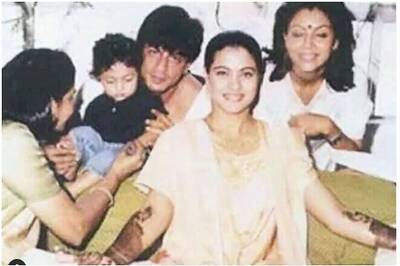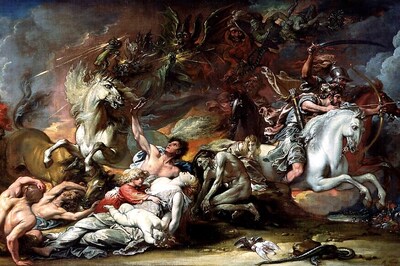
views
In the year 2020, we saw the resurgence of a strong debate around nepotism in Bollywood, triggered by the tragic death of Sushant Singh Rajput. As the year comes to an end, unfortunately the debate is also dying down. Bollywood, which is known for its creativity, tried to define nepotism in its own creative way.
The debate is now new. There have been a few who have been raising the issue for a while, and there have also been marked silence among few. The narrative around the binary of ‘insider’ and ‘outsider’ from the lens of the star kid phenomenon has strengthened. How consistent and inclusive were these debates? Were they real or were they just excuses for mudslinging?
Kangana Ranaut has been vocal against nepotism in Bollywood for a few years now. Last couple of years, she seems to have successfully located herself on the side of the ruling establishment which awarded her a Padma Shri, not very long ago. She recently called out Swara Bhaskar as a ‘needy-outsider’ who is afraid to take on the guardians of nepotism in Bollywood. Swara, on the other hand, has been speaking to power on behalf of citizens and student protesters on a number of compelling issues.
Swara, responding to Kangana, released a 2016 video of her questioning Karan Johar, an undoubted kingpin of Bollywood, on nepotism (Swara questioning Karan in Express Adda is available on YouTube). In the video, Swara called the ways of Karan Johar, in terms of promoting star kids, not merely nepotistic but feudalistic. In asking the question, she makes a difference between conscious and unconscious; seemingly to say only ‘conscious’ decision-making is feudalism.
Karan Johar’s defense is noteworthy. He said that the selection of Alia Bhat and Varun Dhawan in his film was not a result of nepotism. And he went on to say that Varun Dhawan joined as Assistant Director based on a phone call by Dhawan’s mother; and that Alia Bhatt was chosen through a reference from Karan’s writer colleague.
For Karan, none of these came under his definition of nepotism, for he felt that he never looked out for them, and that it all just happened. What is critical is what he said about another actor in his film, Siddharth Malhotra. Siddharth is not a star kid. He said, “Siddharth Malhotra walked into the office to meet Karan Malhotra and the only reason why Karan Malhotra took him on as AD (Assistant Director) is because they had the last same name.”
It all just happened! It was not a conscious decision. What Karan seems to be presuming as something that ‘just happened’, does it happen without any agency? Or is there not an agency of an institution that shapes what are otherwise the unconscious decisions of various persons and institutions in Bollywood? Does the surname, Malhotra, not trigger a filial feeling – a feeling of us, our people, which is the privilege that is associated with being from a dominant caste? Is this not nepotism? And it is surprising that Swara Bhaskar did not question this explanation by Karan Johar? Is this because from the lens of caste, she is probably an insider? Or does she fail to see the structural caste bias or for that matter the blatant casteism used by Karan Johar as an explanation?
When I heard what Karan said about the Malhotras, I was reminded of Rohith Vemula and the attempts at exposing the presence of institutional casteism around his ‘murder’. The brahmanical mainstream dismissed that as rhetoric then.
Today, thankfully and ironically, they have all woken up to call the death by suicide of Sushant Singh Rajput as institutional murder. The institution, for them, happens to be that of nepotism by certain Bollywood mafia, who form groups and monopolise the cinema industry by influencing the entry and exit of stars and thereby dictate stardom. While it is not clear what led to his death, Kangana and team have even identified the guardians of nepotism in terms of a few people- some of them probably not even linked directly to the death or murder. And, the entire debate around the death of ‘Rohith Vemula’ was to help the wider society understand that caste as an institution often leads to nexus and nepotism. This caste-based nepotism is institutional. Dalits face systemic discrimination, causing helplessness, and therefore trauma. Rohith’s death, thus, was an ‘institutional murder’.
What is disconcerting, though not unexpected, is that in this current debate around nepotism in Bollywood, there is no mention of caste. Is that because each one of the stakeholders within the structure is ‘enjoying’ a privilege because they are from dominant caste? This concept of outsider versus insider, should the insider only be defined as one who is either related by birth to a member of the film industry or through friendship or business ties?
Why are insiders not identified by their surnames, like Malhotra, that a person attaches from birth? Being Rajput, did Kangana or Sushant not enjoy any privilege, say, compared to a Seema Biswas? The middle class social media is unable to see the similarity in ‘nepotism through star kid phenomenon such as in the case of Alia or Varun’ with nepotism through caste lens phenomenon, in which even the caste of an outsider like Siddharth is an advantage. Do they not understand or do they not want to understand?
Karan Johar says, “I have not taken any contract (theka in Hindi is a pejorative way of denoting contracting) to introduce new talents in the film industry. As a producer, whether I launch (my relatives or relatives of others), I can do whatever the !@#$ I wanna do” (Karan in an interview available on Reddit).
In other words, Karan, like many others, feels that it is his personal wealth, so he can decide on what would work for him to earn better returns. And the current understanding of freedom and rights, within the market economy, fails to distinguish between freedom and nepotism.
For instance when Swara Bhaskar says, “People should have the freedom to cast whoever they want to cast. If Avinashji wants to cast me, then he should not have the pressure to cast Alia Bhatt or Shraddha Kapoor. Similarly, if Karan Johar wants to cast Alia or Shraddha, he should have the freedom to do that. He should not be judged for that. Sometimes that much openness is needed.” — is she not, surprisingly, justifying nepotism in the name of freedom, that she questioned earlier?
This statement actually sugar-coated the entire discussion around nepotism from the lens of the affluent class in the language of rights and freedom of powerful and legitimised it. The wealth Karan or his family earned is his, but when he instrumentalises his wealth to influence the cinema industry, is that still personal?
The film that he is making is not for his personal consumption but for the public. The process of the making of the film has to follow the democratic principles. For example, the presence of statutory warning against smoking and blurring of cigarettes is the way cinema is trying to be responsible. So, where does the private domain end? Shall there be no accountability, when the person uses his wealth to build a cartel?
The question is what the investor of a movie sees as return of investment – the movie or the nexus? If it is the latter, the investor often uses the movie to build the nexus. For the affluent class, the cartel is essential to sustain power and wealth. The affluent class has relatively easy access to fellow affluent beings. A member of an affluent class builds his/her network to access the best for his/her child. In this scenario, is the child of a bureaucrat or a grandchild of a politician or a nephew of a businessman, an outsider to the movie cartel? Who constitutes this affluent class today? Even a cursory glance into the surnames of the powerful and wealthy would reveal that class is a reflection of caste i.e. the dominant castes constitute the powerful and wealthy.
I remember being very impressed with the film, Article 15, despite many shortcomings. However, what I will not forget is the main actor of the film, Ayushmann Khurana’s statement to the media, during the release of the film: “There is no discrimination in the industry. It is purely on the basis of merit. Nobody discusses caste and religion in the industry. If you are good, you are applauded and rewarded. The industry is very secular and democratic.”
Having been part of such a film, how did the film not introduce in him a dalit political lens to understand discrimination in the society. And why? Is it because he himself is from a dominant caste? An Ayushman, who is an outsider from the lens of star kids, is blind to a truth that Bollywood, for decades, has had negligible dalit presence among leading actors and actresses. Other than Divya Bharti, Johnny Lever or Seema Biswas, dalit actors do not even have the luxury to be called an ‘outsider’ like Tapsee or Siddharth or Swara Bhaskar. Dalit actors fall outside of Bollywood. And we continue to believe that there is no caste-based discrimination in Bollywood. Of course, there can be no caste-based discrimination within an Agraharam!
Vivek Agnihotri, anyway a right-wing apologist, once said, “In the 25 years that I have spent in the film industry, not even once anyone asked me my caste nor did I ask anyone. Suddenly, since the advent of (the director of Masaan) Ghyawan’s politics, things have started changing. In my office we have come to learn that some of my assistants are from the so-called lowest castes. Not because anyone cares what their caste is, but there is this sudden consciousness on both sides, and it’s never good for creativity”.
This was in response to Ghyawan’s advertisement for Dalit-Bahujan-Adivasi applicants for his forthcoming film. Ghyawan’s action has led Vivek to become conscious of the caste of his team members and this is progressive, for recognition of caste is only the first step towards recognising the lived realities of people belonging to the oppressed castes. But his insistence that being conscious has negative implication on creativity is problematic, for what he does not understand is that the caste discrimination exists and will continue to exist whether he is conscious about other persons caste or not.
Creativity is already affected owing to exclusion of one section of people and their experiences. Ghyawan is just attempting to address this barrier and in his attempt has been accused, by Vivek, for ‘sinister politics around caste’’. Ghyawan, of course, cannot be called nepotistic, for he does not hold any power within the cinema circle. It is not surprising that Ghyawan’s use of affirmative action was responded by statements such as “Casteism is Casteism, whether done by a Brahmin or a Dalit”; “it’s not caste discrimination only when SCs and STs are denied the opportunities but it is also when the general castes, which only compete with their talent and merit are also denied the opportunity” and “Casteism must be kept far, far away from the Art”.
What about all the gharanas and family and caste-based hegemony that is already present in many art-forms – Is it not hegemony of caste and community? Is it not nepotism based on caste? It is, thus, important to recognise that Ghyawan’s act of affirmative action is a counter to nepotism by certain sections of the society to perpetuate their control over the art and the industry.
A star child, Sonam Kapoor, on the other hand, tried to even make virtue of this ‘privilege’. She said, “On Father’s Day I’d like to say one more thing, yes I’m my father’s daughter and yes I am here because of him and yes I’m privileged”. She adds, “That’s not an insult, my father has worked very hard to give me all of this. And it is my karma where I’m born and to whom I’m born. I’m proud. To be his daughter,” What does ‘Karma’ mean here? Is it correct to decide ‘privileges’ based on one’s ‘karma’ which is also linked to ‘where’ one is born and ‘to whom’? Those who understand caste and have read the infamous Manu Smriti, would know how ‘karma’ defines the caste of the person- especially into which caste a person ‘has’ to be born. It’s just that the society has conveniently learnt how to make statements similar to what is written in the Smriti, without using the word, caste or one can say, the society reflects the ideology of manusmriti and does so without mentioning caste.
What is perturbing about this Brahmanical society of ours is our ability to facilitate a debate on ‘nepotism’ by clearly laying down an artificial boundary to debates- a boundary that excludes arguments around caste; and worse, those who raise those arguments are called out and labelled casteist. One needs to appreciate Divya Bharti, Johnny Lever and Seema Biswas for what they have achieved as actors within this casteist environment of Bollywood; and Ghyawan or Pa Ranjith or Ginni Mahi for actually trying, firmly, to fight the caste-based structural nepotism, which, undoubtedly, defines the other forms of nepotism – based on familial ties or affluence.
Not long ago we saw enough posts from Bollywood actors supporting black lives matter. It was great to see the Bollywood stand in support of a community that has been marginalised and oppressed for centuries. Question is, when they can raise their voice for an oppressed community in the West, why is it that we do not see the same Bollywood fraternity show concern about a community that has been marginalised for centuries in India, much worse, one that is absent among leading actors in Bollywood? We know that race and caste are similar in their manifestations and their exclusionary elements, overt and subtle. So, when will Dalit Lives Matter to Bollywood?
The author is currently Director, Partners in Change, New Delhi, and Honorary Fellow, Durham University, UK. Views expressed are personal.
Read all the Latest News, Breaking News and Coronavirus News here




















Comments
0 comment